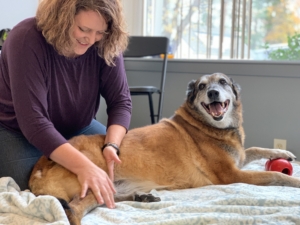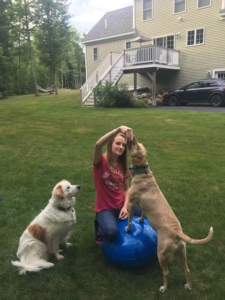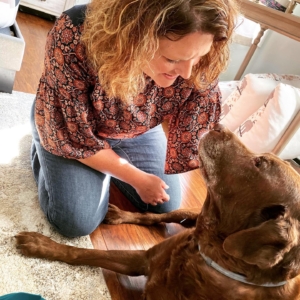What is Pet Rehab?
Rehabilitation, also known as animal/pet physical therapy, is the practice of providing rehabilitative care to pets who have gone through surgery, have suffered an injury, or are experiencing chronic pain. It can help pets to recover significantly faster from illnesses and injuries, and to live an overall better quality life.
Senior pets can also benefit from rehabilitation therapy. It is helpful for pain, but also for physical and mental enrichment.
Our rehabilitation therapy is based on the individual patient’s needs, and may include many treatments including but not limited to: cold laser therapy, acupuncture, massage and manual physical therapies, and underwater treadmill. Homework exercises are also included.
What to Expect at Your Rehab Therapy Appointment
 When you schedule a rehabilitation therapy consultation with Dr. Wilson, you can expect a 1.5 hour-long appointment, including the following:
When you schedule a rehabilitation therapy consultation with Dr. Wilson, you can expect a 1.5 hour-long appointment, including the following:
Getting to Know You:
Pet Records/History Review
During the first 20 minutes, our rehabilitation therapist will spend some time getting to know you and your pet. This gives us an opportunity to talk and to discuss your pet’s medical history, diagnosis, and your concerns before the appointment. This is a telemedicine call.
The In Clinic Assessment and Examination

The remaining portion of your appointment will be an exam. We will examine your pet’s gait and make notes about their posture. Then, we will focus attention on the muscles evaluating several areas including:
- Is there tension in any of your pet’s muscles?
- How flexible is your pet with movement?
- Are your pet’s muscles tight? Are the triceps tight?
- Does the muscle spasm when she palpates certain areas?
- Are certain areas painful to the touch?
- What is their strength level?
- During the examination, will also measure your pet’s muscles to get an idea of how much muscle loss there may be from not bearing as much weight on certain limbs.
Exercise Recommendations
Exercises will be recommended to help strengthen muscles that your pet may be avoiding due to an injury or pain. Recommendations will be customized based on your pet’s unique concerns, and a home exercise program will be formulated to help with your pet’s diagnosis.
You’ll also receive notes to take home and share with other family members, so they can help with the exercises, too. It helps to get everyone involved in the rehab process, so your pet can get the best results.
Treatment
Treatment will be based on discomfort, pain, or inflammation that was found, or that was discussed during the exam. We focus on the “whole body” so not just the concern your pet was diagnosed with, but also any issues secondary to compensation , for example.
Treatments may include neuromuscular stimulation, pulse electromagnetic therapy bed, and/or cold laser therapy. Other specialty treatment recommended may include underwater treadmill therapy amd/or acupuncture.
Acupetvet’s Approach to Treatment
Acupetvet values integrative medicine and focuses on looking at the patient as a whole, treating not only the symptoms but also the cause. Our end goal is always “making better tomorrows for your pet.”
Watch this short video to get a sneak peek of the clinic, and Dr. Wilson at work:
See Dr. Wilson in action:
Schedule a Rehabilitation Consultation
Have you noticed your pet isn’t putting pressure on a certain limb, having difficulty jumping, or doing normal everyday activities like sitting or getting up? Is your older dog or cat showing a decrease in energy or are they starting to have some muscle loss? Did your pet just have surgery or is in need of surgery?
If you have noticed any of these things, or if you think your pet may be experiencing pain or discomfort, schedule a consultation today.



